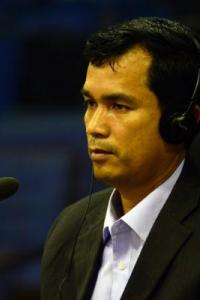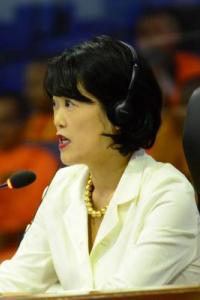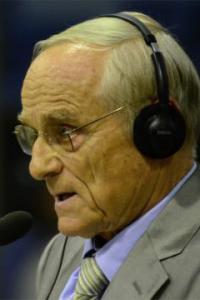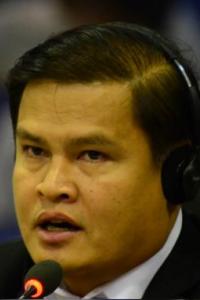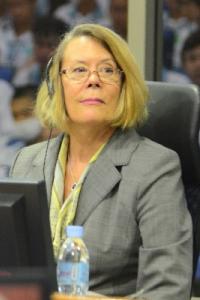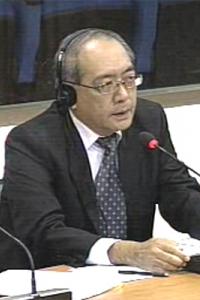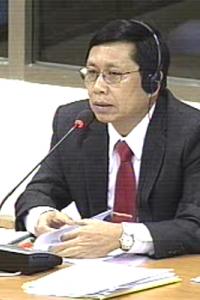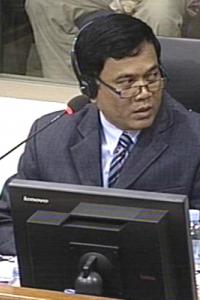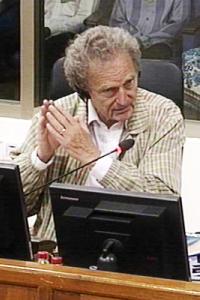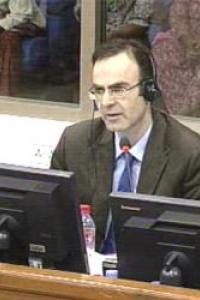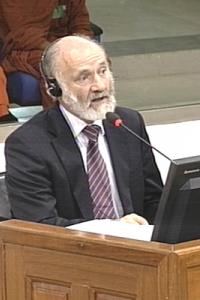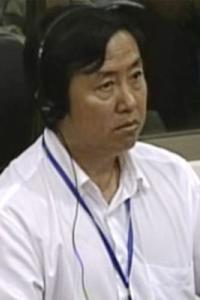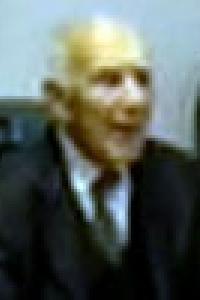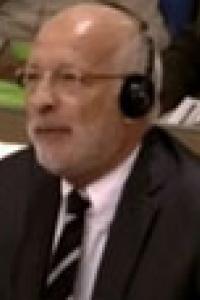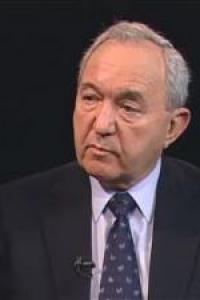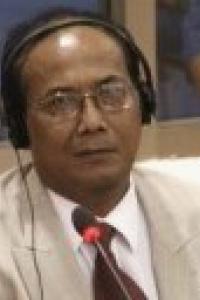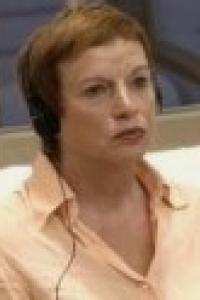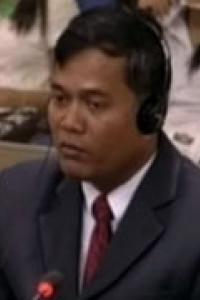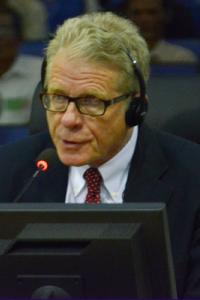Expert
Witnesses, experts and Civil Parties who have appeared in Case 002
Mrs. HIN Sotheany
Ms. Hin Sotheany, the compiler of the list of prisoners at S-21, spent 24 months from April 2014 to March 2016.
Mr. VOEUN Vuthy
Voeun Vuthy was born on December 5, 1973 in Siem Reap. He lost his father and other five member of his family to the regime.
Mr. Stephen John MORRIS
The expert was born in 1949. He is an Australian researcher, writer and teacher in international politics and history.
Ms. LEVINE Peggy
The Australian-American academic Peg LeVine was born in 1952.
Ms. Kasumi Nakagawa
She was an expert witness testifying on forced marriage during the Khmer Rouge period.
Henri Locard
Mr. Henri Locard provided 4 days of expert testimony at the Trial Chamber of the Extraordinary Chambers in the Courts of Cambodia (ECCC).
Mr. Ysa Osman
45 years of age at the time of his testimony, Mr.
HINTON Alexander Laban
The Expert Witness will be examined on: the history of the CPK; the origins and evolution of CPK policies
Ms. Elizabeth Becker
Ms. Becker is a former journalist with the Washington Post and the New York Times and she is the author of the book "When the war was over: Cambodia and the Khmer Rouge Revolution". She was one of only two western journalist who was allowed to visit Democratoc Kampuchea. During her visit in December 1978 she interviewed Pol Pot and Ieng Sary.
Dr. CHAN Kin Ming, Medical Expert
Dr. CHAN Kin Ming is a Singaporean geriatrician appointed by the Trial Chamber as medical expert to assess NUON Chea and KHIEU Samphan
Dr. HUOT Lina, Medical Expert
Dr. HUOT Lina is a psychiatrist appointed by the Trial Chamber as medical expert to assess NUON Chea and KHIEU Samphan
Mr. Stephen Heder
Mr. Heder is an American scholar who was called to testify about the books he has authored and interviews he has conducted with the Accused and other cadres relevant to the regime of Democratic Kampuchea. He previously worked in the ECCC’s offices of the Co-Prosecutors and then of the Co-Investigating Judges. Since the Khmer Republic period in the early 1970s, he had worked as a journalist and researcher in Cambodia, and continued to cover Cambodia even after he left the country in April 1975. Seven Candidates for Prosecution: Accountability for the Crimes of the Khmer Rouge.
Dr. CHHIM Sotheara
Dr. CHHIM Sotheara provided expert testimony about his mental health work with Khmer Rouge survivors.
Mr. Philip Short
M. Philip Short est un auteur et journaliste britannique. Il est l'auteur du livre "Pol Pot : Histoire d'un cauchemar".
Dr. Seena Fazel
Dr. Seena Fazel (Unted Kingdom), Forensic Psychiatrist,was appointed as one of the experts to examine Nuon Chea's fitness to stand trial.
Professor John Campbell
Professor Campbell was appointed as and expert to assess the current medical condition and treatment of Ieng Sary.
Professor David Chandler
David Chandler is an Emeritus Professor at Monash University, and holds degrees from Harvard, Yale and Michigan Universities.He has authored a number of books relating to the Democratic Kampuchea period and S-21 and was called as an expert in Case 001. Unlike that case, where Professor Chandler testified at length regarding the day-to-day operations of S-21, his testimony in Case 002/01 was instead sought principally for an analysis of the policies that established S-21 and the broad purpose and function of security centres (and S-21 in particular) in Democratic Kampuchea.
Dr. LIM Sivutha
Dr. Lim is a medical doctor in the emergency section at the Khmer Soviet Friendship hospital.
Mr. Stephane Hessel
Stephane Hessel, aged 91, a former French resistance fighter who was deported to a Nazi concentration camp, was called by the Defense in order to contribute as an expert on the issue of forgiveness. After the war, he took part in drafting the Universal Declaration of Human Rights in 1948 alongside Rene Cassin and worked toward French-German reconciliation in post-war Europe. As an expert, Mr. Hessel told the Trial Chamber that it is essential not to expect forgiveness from the victims while moving toward reconciliation at the national level. He underlined that it is a right of the victims to reject any type of forgiveness after the judgment. He elaborated on the concept of reconciliation, which he defined not as forgiveness of the victims, but as the process of building up a peaceful nation, which can only be done once impunity ends. He argued that the sine qua non condition for reconciliation is that all facts must be known: "the concept of reconciliation should go hand in hand with the concept of truth".
Mr. Raoul Marc Jennar
Raoul Marc Jennar, 63, a consultant in the field of international relations, was called to testify as an expert on issues relating to practical and theoretical foundations and operations of the Democratic Kampuchea (DK) regime of terror. During his testimony, Mr. Jennar identified three foundations of terror as a DK method of government. First, he described the culture of violence in Cambodia, which was internally sustained by the violent repression of opposition since the country's independence in 1953 and externally exacerbated by the American bombings. Second, he pointed out the political culture of the DK leaders: strongly influenced by a Bolshevik conception and a Stalinist practice of communism, they adopted an iron discipline and eliminated doubtful elements. Third, Raoul Jennar mentioned the specificities of Pol Pot's unique interpretation of the Marxist-Leninist doctrine accentuated state terrorism. Mr. Jennar told the Trial Chamber that he accepted the statement of the Accused as being simultaneously "a servant and a hostage" of the Khmer Rouge system, as he considered that nobody under such a regime disposed of a margin for maneuver . He further argued that the leaders at the highest level should shoulder, first and foremost, the greatest responsibility. He underlined the existence of other DK security centers, arguing that the directors of the centers in which a higher number of victims were killed also qualified as those "most responsible" for DK crimes.
Justice Richard Joseph Goldstone
Justice Richard Goldstone, 70, visiting professor of law at Frodham University, was called as an expert to testify on issues relating to guilty pleas in international criminal tribunals. Justice Goldstone told the Trial Chamber that three important aspects were to be taken into account when determining the sentence: the nature of the crime, the interest of victims, and the interests of society.
Mr. Ka Sunbaunat
Ka Sunbaunat, 56, Dean of the Faculty of Medicine at Royal Phnom Penh University, was called as an expert to present a psychological assessment of the Accused conducted in 2008 with an update in August 2009.The experts testified that the Accused does not present any indication of mental or psychological disorder.
Ms. Francoise Sironi-Guilbaud
Francoise Sironi-Guilbaud, 51, Professor of Psychology at University of Paris 8, was called as an expert to present a psychological assessment of the Accused conducted in 2008 with an update in August 2009.The experts testified that the Accused does not present any indication of mental or psychological disorder. They described him as a ìdutiful person, readily influenced by [and] responding well to strong leadershipî, with a ìneed for affiliation, and for recognition and acknowledgement by his superiors.î Marxist ideology satisfied his need for certainty and was subsequently replaced by Christianity.They described his psychological behavior as characterized by obsessional traits, pragmatic and mathematical reasoning, disempathy, and alexithymia. They noted that the Accused was able to construct powerful defence mechanisms insulating him from emotional reactions and inner conflicts created by his external reality, mechanisms which they described as ultimately enabling him to nurture his own family whilst overseeing the deaths of children at S-21. However, the experts also perceived the Accusedís greater capacity for self-reflection regarding his life and actions as the investigation and trial progressed. The experts used a "geopolitical" method of assessment which analyses the articulation of both personal and collective history that was developed by Francoise Sironi-Guilbaud in her practice. In order to understand the Accused, she argued, it was necessary to take into account the weight of political, economical, historical, and cultural factors on his personality. Both experts stated that they believed that the Accused could be rehabilitated and reintegrated into society based on his past experiences and his present condition.
Chhim Sotheara
Dr. Chhim, 41, a psychologist and director of Cambodia PTO, was called to testify as an expert on the psychological impact of the Khmer Rouge regime. He detailed the consequences regarding the mental and physical condition of family members of direct victims of S-21 and the nature of the trauma resulting from the knowledge of a relative's death.
Professor David Chandler
David Chandler is an Emeritus Professor at Monash University, and holds degrees from Harvard, Yale and Michigan Universities.He has authored a number of books relating to the Democratic Kampuchea period and S-21 and was called as an expert in Case 001. Unlike that case, where Professor Chandler testified at length regarding the day-to-day operations of S-21, his testimony in Case 002/01 was instead sought principally for an analysis of the policies that established S-21 and the broad purpose and function of security centres (and S-21 in particular) in Democratic Kampuchea.
